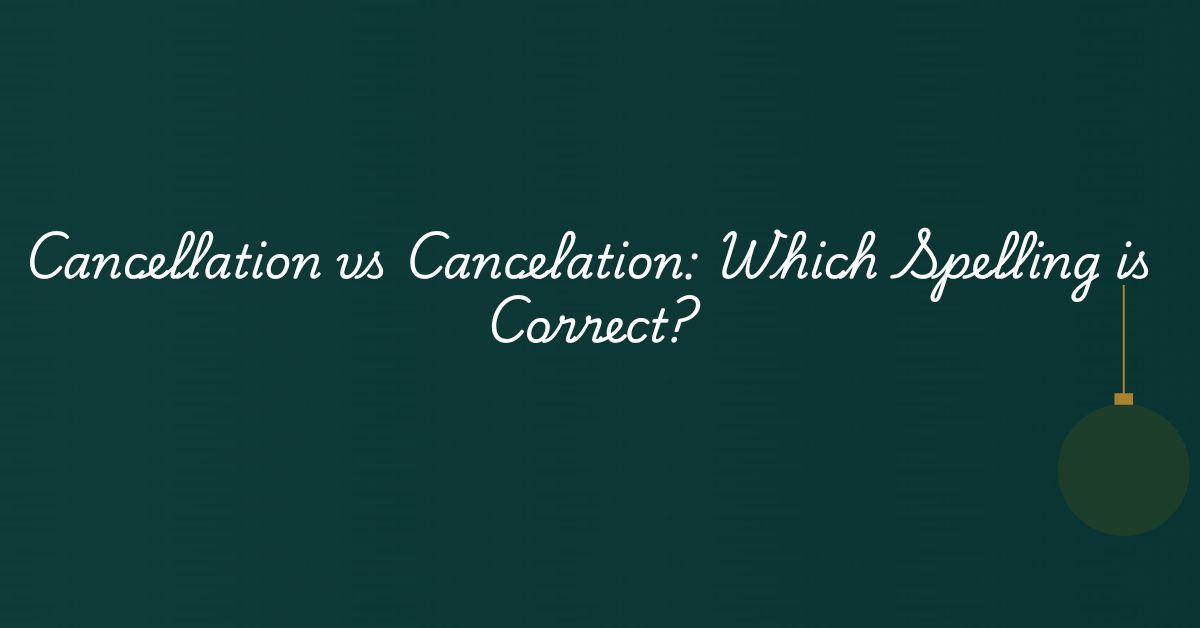When it comes to the nuances of English spelling, many people find themselves puzzled by the terms “cancellation” and “cancelation.” This common confusion can lead to uncertainty in writing, especially for students and professionals alike. Understanding the differences between these two spellings is essential for clear communication.
The distinction lies in their usage across different forms of English; “cancellation” is the preferred spelling in British English, while both forms are accepted in American English. This article will clarify these variations and provide insight into the rules governing their usage. By grasping these subtleties, you can enhance your writing and avoid common pitfalls.
In this article, we will explore the meanings, origins, and correct usages of “cancellation” and “cancelation.” Additionally, we’ll delve into the historical context and spelling conventions that shape these terms. Get ready to gain a clearer understanding of this topic and improve your writing skills!
Why is There Confusion?
The confusion surrounding “cancellation” and “cancelation” often stems from the variations in how English words are spelled and adapted over time. Many writers encounter both forms in different contexts, leading to uncertainty about which one is considered correct. This inconsistency is particularly noticeable in various sources, such as books, websites, and official documents, where both spellings might appear, contributing to the overall ambiguity.
Additionally, the presence of both versions in spell-checking tools or writing platforms adds to the confusion. Many people find themselves questioning the preferred spelling and whether they are adhering to the correct spelling rules associated with British and American English. As a result, understanding these differences is crucial for anyone aiming for writing clarity and accuracy.
What Do “Cancellation” and “Cancelation” Mean?
Both “cancellation” and “cancelation” refer to the act of calling off or putting an end to something that was planned or scheduled. Whether it’s a flight, an event, or a subscription, when something is canceled, it is officially stopped or withdrawn. Despite the spelling difference, the meanings remain consistent, reflecting the action of nullifying arrangements.
The root of the word comes from “cancel,” which means to make something invalid or to stop something from continuing. Understanding this definition helps clarify why both terms are used interchangeably in many contexts. Ultimately, regardless of the spelling you choose, both “cancellation” and “cancelation” convey the same essential concept of an official end to a previously arranged plan or agreement.
“Cancellation vs Cancelation”: Which Spelling Should You Use?
When deciding between “cancellation” and “cancelation,” the correct spelling largely depends on the form of English you are writing in. In British English, “cancellation” with two “l’s” is the standard and widely accepted spelling. Conversely, in American English, while “cancelation” with one “l” is occasionally used, “cancellation” remains the more common choice.
Most official documents, publications, and dictionaries in both regions prefer “cancellation.” This preference aligns with the general pattern of spelling conventions where British English retains more traditional forms, while American English often opts for simplification. To maintain consistency and avoid confusion, it’s best to stick with “cancellation” in most cases, ensuring your writing remains clear and professional.
What’s the Meaning of Cancelation and Cancellation?
Both “cancelation” and “cancellation” refer to the act of officially calling off or terminating something that was previously planned or scheduled. This can apply to a wide range of scenarios, including canceled flights, events, or subscriptions. Despite the spelling differences, the core meaning remains the same, emphasizing the action of nullifying or making something invalid.
In addition to the primary definition, these terms can also refer to the act of crossing out something written or a mark made on a postage stamp to indicate it has been used. Understanding these meanings helps clarify the contexts in which each form might be employed, ensuring effective communication. Regardless of which spelling you choose, both terms are essential in conveying the concept of an official end to an arrangement.
Why Do American and British English Differ in the Use of Single or Double “L”?
The difference between the single “l” in American English and the double “l” in British English stems from historical changes in spelling conventions. In the early 19th century, American lexicographer Noah Webster introduced several spelling reforms aimed at simplifying English. This led to the adoption of forms like “canceled,” “traveling,” and “modeling,” which use a single “l.”
Conversely, British English retained the traditional spelling patterns, where the double “l” is used in words like “cancelled,” “travelling,” and “modelling.” This distinction not only reflects regional language preferences but also highlights how language evolves over time. Understanding these differences is crucial for writers to ensure they are following the correct conventions based on their audience.
What Are the Synonyms of Cancelation and Cancellation?
Understanding synonyms for “cancelation” and “cancellation” can enhance your writing and expand your vocabulary. Some common synonyms include:
- Annulment: This term is often employed in legal contexts to indicate the act of declaring something invalid or void.
- Termination: A formal way to describe the ending of an agreement, contract, or process.
- Abolishment: Implies the official removal of something, often used in legal or formal contexts.
- Revocation: Typically used to describe the official canceling or withdrawing of something.
- Rescission: Refers to the act of revoking a contract or agreement.
- Calling off: A more informal synonym used for canceling events or plans.
- Invalidation: Describes the process of making something no longer valid or effective.
These synonyms can be useful in various contexts, allowing for more nuanced expression while conveying the same idea of cancellation or termination.
Examples in Context
To better understand how “cancelation” and “cancellation” are used, here are some examples in context:
- “The unexpected cancellation of the concert left many fans disappointed.”
- “Due to unforeseen circumstances, the event’s cancelation was announced just hours before it was set to begin.”
- “If you request a cancellation within 24 hours, you are eligible for a full refund.”
- “The airline’s policy regarding flight cancelations is quite flexible.”
- “The last-minute cancellation affected many attendees who had already made travel arrangements.”
These examples illustrate the practical application of both terms in everyday language.
Cancelation or Cancellation – It’s All Clear! Examples of Those Two Words in Sentences
Understanding the difference between “cancelation” and “cancellation” can significantly improve your writing. Here are a few more sentences showcasing the usage of both terms:
- “After much deliberation, the committee decided to proceed with the cancellation of the project.”
- “The cancelation of the meeting was communicated via email to all participants.”
- “A sudden cancellation due to bad weather can disrupt travel plans for many.”
- “She received a notification about the cancelation of her flight just before heading to the airport.”
These sentences highlight the interchangeable use of the two spellings while maintaining clarity in the message.
Origins of “Cancellation”
The word “cancellation” dates back to the 1530s and is derived from the Latin term cancellationem, which means “to make lattice-like” or “to cross out.” Initially, this referred to marking lines through text to indicate nullification. Over time, the modern usage of “cancellation” developed to signify the act of calling off an event or arrangement.
Interestingly, the term found its way into early medical writing in the 15th century, particularly concerning the crossing of retinal images. By the 20th century, “cancellation” became commonly associated with canceled reservations and appointments. Understanding its historical context enriches our appreciation of the term and its evolution in the English language.
Conclusion
In summary, the choice between “cancellation” and “cancelation” largely depends on the form of English you are using. In British English, “cancellation” with two “l’s” is the accepted spelling, while in American English, although “cancelation” is occasionally used, “cancellation” remains the dominant form. Understanding the meanings, origins, and appropriate contexts for each spelling is essential for clear and effective communication.
By familiarizing yourself with the differences and synonyms, you can enhance your writing and avoid common pitfalls. Whether you are drafting official documents or casual correspondence, using the correct spelling will help maintain clarity and professionalism in your work.
FAQs
1. Are “cancellation” and “cancelation” interchangeable?
Yes, both terms convey the same meaning, but their usage may vary based on British or American English conventions.
2. Which spelling is preferred in British English?
In British English, “cancellation” with double “l’s” is the preferred spelling.
3. Is “cancelation” commonly used in American English?
While “cancelation” is accepted in American English, “cancellation” is more widely used and recognized.
4. What are some synonyms for “cancellation”?
Synonyms include annulment, termination, revocation, and invalidation, among others.
5. What is the origin of the word “cancellation”?
The term originates from the Latin cancellationem, meaning “to make lattice-like” or “to cross out,” and has evolved to refer to the act of nullifying arrangements.
Read More:
- How to Pronounce What in English: A Simple Guide for Language Enthusiasts
- 105+ Adjectives Start with N: Words That Start with the Letter N
- 99+ Adjectives Start with S: Words That Start with the Letter S
- Abbreviation for Kindergarten? Definition & Meaning

